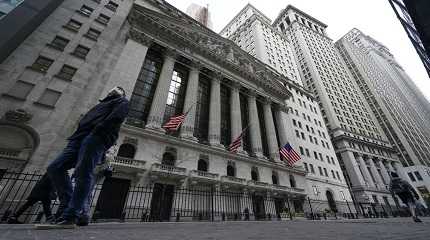
New York (AP) — Wall Street futures followed global markets lower Tuesday amid a bevy of U.S. earnings reports and an update on economic growth.
Futures for the Dow slipped 0.2% and the S&P fell 0.4%.
Dozens of the nation’s biggest companies, including Microsoft and Amazon, are due to report earnings this week. McDonald’s rose before the bel l after the fast food chain reported higher-than-expected sales and profit in the first quarter.
General Motors jumped more than 3% after strong U.S. sales boosted profits and the company raised guidance based on expectations that demand will remain robust.
Analysts expect companies in the S&P 500 to report their biggest drop in earnings since the spring of 2020, when the pandemic paralyzed the economy. But the majority of companies so far this earnings reporting season have been beating the projections of Wall Street analysts.
On Thursday, the U.S. releases new data on economic growth during the first three months of the year. Economists believe growth slowed in that time due to interest rate hikes that are being used by the U.S. Federal Reserve to cool stubbornly high inflation. Economists expect growth to slow to 1.9% at an annual rate, down from 2.6% in the final quarter of 2022.
If the economy cools, tech stocks will face a “difficult environment” maintaining the high stock prices that have helped to buoy the market, Edward Moya of Oanda said.
Two tech-centric banks, Silicon Valley Bank and Signature Bank, collapsed in March and have dragged down other regional banks as well.
Late Monday, First Republic Bank said its depositors pulled more than $100 billion out of the bank during last month’s crisis, as fears swirled that it could be next. Shares are plunging before the opening bell Thursday.
The Fed meets next week and much of Wall Street expects the U.S. central bank to raise interest rates at least one more time before pausing. Many traders are betting the Fed will cut rates later this year to prop up the economy. But Fed officials have insisted they will keep rates high at least through the end of this year.
Higher rates have slowed U.S. housing sales by making mortgages more expensive. Manufacturing and other areas of the economy have also shown pain, while the job market has stayed resilient.
At midday in Europe, the FTSE 100 in London fell 0.3% and the CAC 40 in Paris retreated 0.6%. The DAX in Frankfurt was essentially unchanged.
In Asia, the the Shanghai Composite Index lost 0.8% to 3,264.87 while the Nikkei 225 in Tokyo gained less than 0.1% to 28,620.07. The Hang Seng in Hong Kong sank 1.9% to 19,578.20.
The Kospi in Seoul fell 1.4% to 2,489.02 after South Korea reported unexpectedly strong economic growth in the first quarter, avoiding a technical recession. Korean economic activity expanded by 0.3% over the previous three-month period, rebounding from a 0.4% contraction.
India’s Sensex advanced less than 0.1% to 60,105.07. Singapore and Bangkok declined. New Zealand and Australian markets were closed for a holiday.
In energy markets, benchmark U.S. crude lost 53 cents to $78.23 per barrel in electronic trading on the New York Mercantile Exchange. The contract rose 89 cents on Monday to $78.76. Brent crude, the price basis for international oil trading, lost 53 cents to $82.01 per barrel in London. It advanced $1.07 the previous session to $82.73.




